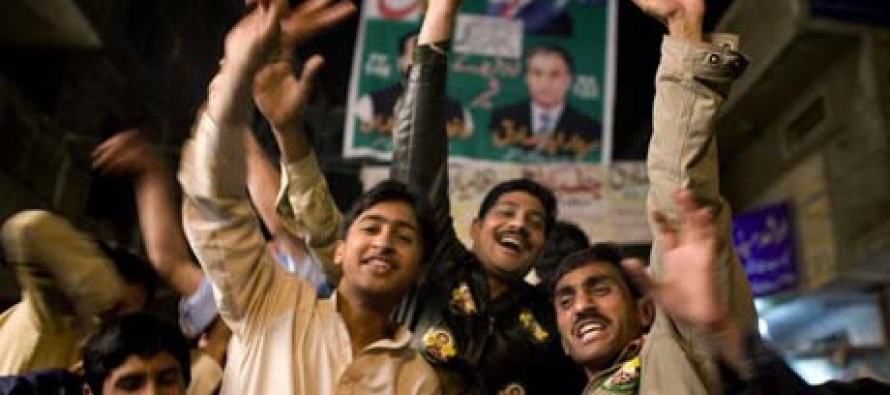People’s Power in Pakistan

Ordinarily one connects Pakistan’s politics with military coups. However, this time what occurred in Pakistan on 16th March was for the first time a successful manifestation of people’s power to restore democracy and rule of law. This is a great victory of people, signaling detribalisation and secularisation of politics in Pakistan.
Although President Asif Ali Zardari signed a deal with Nawaz Sharif to form a coalition government with a promise to restore the top judge of the Pakistan’s apex court Iftikhar Chaudhry, sacked second time by former military President Pervez Musharraf in November 2007
Zardari failed to keep his promise.
Sharif’s party withdrew from the government last August for failure to keep the promise. One reason for Zardari’s reluctance to reinstate all of them is thought to be the fact that Justice Chaudhry had challenged an amnesty given by Gen Musharraf that enabled Zardari to return to Pakistan. If the amnesty was overturned, Zardari could be left exposed to corruption charges.
Both Zardari and Sharif have been playing political “cat and mouse” game for some months until the country plunged into greater instability where thousands of Sharif’s supporters came on the streets across the country when, on 25th February, the pliant Supreme Court banned Nawaz Sharif and his brother Shahbaz Sharif to hold any political position because of previous criminal convictions, a rule that could apply just as well to Zardari himself.
There is a strong perception that the Zardari’s Government has convinced the Supreme Court (constituted under Provisional Constitutional Order by General Musharraf on 3rd November 2007 sacking the Chief Justice and other judges of the Supreme Court) to rule against Nawaz Sharif.
Political observers believe Zardari’s failure to restore the top judge has galvanised not only the opposition parties but also lawyers, and civil society throughout the country. Nawaz Sharif saw it a great moment to call a “Long March” to the capital Islambad on March 13. The demands of Nawaz Sharif of restoring the judges and democracy have turned into “people’s demands”.
Sharif showed his guts to come out of the house (where he was put on house arrest, later denied by the government) in Lahore to lead the march, and the police was a silent spectator, given the size and determination of cross section of civilian protesters including women.
On March 16 early morning, Prime Minister Raja Yusuf Gilani in a nationally TV address accepted the demands of Nawaz Sharif who then called off the long march.
BBC correspondent says that everyone, including Pakistan’s Western supporters, has heaved a sigh of relief that what looked to have been a dangerous political confrontation appears to have been defused peacefully.
The West wants Pakistan to focus on the battle against the Taliban on the Afghan border.
On 15th and 16th March, fresh evidence of the militant insurgency took place with attacks on container terminals near Peshawar in the north-west. The terminals supply Nato and US troops in Afghanistan.
Zardari has conceded to the demands of Nawaz Sharif and some of reasons deserve mention as follows:
* Obama’s administration has been willing to deal with Nawaz Sharif unlike the Bush administration. US Ambassador Richard Holbrooke, Presidential special representative for Pakistan and Afghanistan reportedly met Sharif last month. To the US, Sharif could be a useful partner as Washington tried to talk to what it considered reconcilable elements in the Taliban. Therefore there was huge pressure on Zardari from Washington to concede to the demands of Sharif.
* the powerful army in the country played a key role in defusing the crisis. Its chief General Ashfaq Kayani let Zardari know that he could not rely on army to confront the civil protesters. General Kayani, teamed up with Prime Minister Gilani, reportedly met Zardari and advised him to defuse the political upheaval.
* Sharif understood the pulse of the nation and he exploited fully the undemocratic conduct of President Zardari. He has reinvented himself, symbolising democracy and rule of law.
* there is a widespread belief that people’s active involvement is imperative to fight against extremists and the Talibans and the representative government and civil society need to be reinforced in Pakistan. Accordingly Zardari’s plan to corner Sharif politically went out of gear.
Georgetown University professor and South Asia expert Robert Wirsing termed Zardari’s climb down “a horrendous blow to his prestige” Morally and politically President Zardari has been weakened.. Prime Minister Gilani has become politically “ten feet taller” to the eye of people.
There could be more steps by the government to reach out to Nawaz Sharif on a range of political reforms proposed under the Charter of Democracy signed by Sharif in 2006 with Ms. Benazir Bhutto who was assassinated on 27th December, 2007.
What occurred in Pakistan is a good news for the country where it is in short supply.We wish Pakistan’s success to road to democracy.
By Barrister Harun ur Rashid
Former Bangladesh Ambassador to the UN, Geneva.


